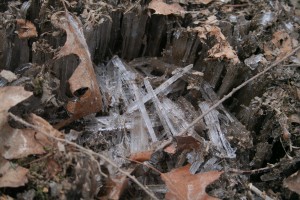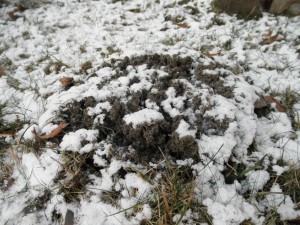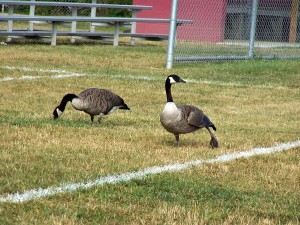Want a two or three week head start on getting your athletic fields ready for spring? Consider a proven IPM practice: dormant overseeding.
Yes, right now those artic blasts might still be leaving us chilled. But winter weather has its advantages: snowmelt and freeze-thaw cycles can aid in both pushing and pulling seeds into the ground, maximizing seed-to-soil contact.

Freeze-thaw cycles can affect soil dramatically, opening crevices and ridges that seed can slip into and will later collapse, maximizing seed-to-soil contact. Photo Credit: Joellen Lampman
Meanwhile, spring is just around the corner — meaning it’s time to be on the lookout for weather conditions that allow you to apply grass seed. So secure your seed and calibrate your spreaders.
What conditions are you looking for? Choose a time when:
- there’s no snow cover
- nighttime temperatures are predicted to dip below freezing and …
- days warm to above freezing.
Ideally the forecast will also call for snow — snow that will push the seed into the ground while also protecting the seed from marauding birds. When that snow melts and is absorbed into the soil, it also helps pull your seed down through the crowns of existing plants, further increasing seed-to-soil contact.

Frost heaving is more extreme on bare soil. Note that the effect of frost heaving is reduced on the area covered by grass. Photo Credit: Michal Maňas
Choose which seed to apply by your expectations for each field. Will your athletes be on the field in early spring? Then apply the quickly germinating perennial rye at a rate of 6 lbs./1000 ft2. If you have fields that won’t be used until June or July, apply Kentucky bluegrass at a rate of 3 to 4 lbs./1000 ft2. There will be some loss due to seed mortality, so these rates are 50% above conventional rates. If your budget is low, you can reduce costs by only overseeding on bare soil.
Your IPM benefits? Dormant seeding allows you to avoid cultivating the turf when the soil is too soft and wet to work. It saves fuel and equipment costs, too. And getting this turf management practice out of the way early means you’re better set up for the busy field season. Best of all, the seeds you apply in winter can germinate two to three week earlier than those applied during a conventional spring seeding — and your grass will be better able to face the onslaught of spring weeds and athletic cleats.
Want more info on maintaining athletic fields? Seek no further: Sports Field Management.

